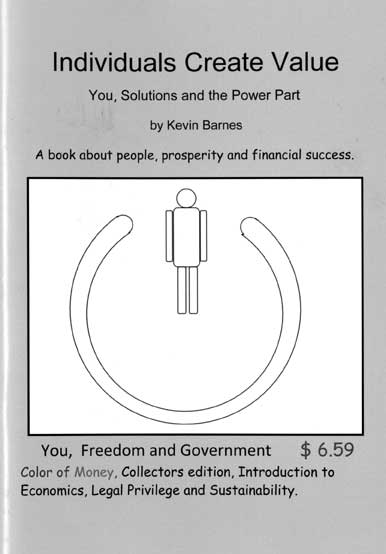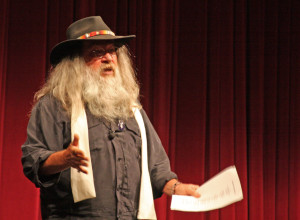Individuals Create Value
By Kevin Barnes
Self published, Booktango, Bloomington IN 58 pages
Reviewed by Forrest Whitman
 In 58 pages, Salida author Kevin Barnes attempts to untangle one of the oldest questions about society: How does the individual create value within the sometimes oppressive rules of a society? Barnes gives credit to Thomas Jefferson for many of his ideas. The Jeffersonian ideal of the individual representing himself before the body politic comes up often. Barnes sees the enemy of this ideal as what he calls “legal privilege” or “might makes right.” As any society makes more rules, the individuals creating value are stifled. The more rules, the less prosperity.
In 58 pages, Salida author Kevin Barnes attempts to untangle one of the oldest questions about society: How does the individual create value within the sometimes oppressive rules of a society? Barnes gives credit to Thomas Jefferson for many of his ideas. The Jeffersonian ideal of the individual representing himself before the body politic comes up often. Barnes sees the enemy of this ideal as what he calls “legal privilege” or “might makes right.” As any society makes more rules, the individuals creating value are stifled. The more rules, the less prosperity.
Barnes doesn’t take on the obvious objection to the Jeffersonian ideal. The top 1% of individuals in our current society (in the U.S.) usually speak far more loudly than any less powerful individual. Also, most of the productivity in our society depends on government infrastructure to function. In that sense government does, indeed, create value. This doesn’t negate the Jeffersonian ideal. The individual does create value too. Sometimes an individual’s idea can go viral on the internet. Now and again political candidates have won on their individual platform. Individuals matter. But in Jefferson’s time the idea of government, especially being moved by individuals representing themselves, was far more plausible.
Barnes cites many examples to prove his thesis about how “legal privilege” stifles individuals creating value. For instance, government meat inspection. He thinks this gets in the way of good meat being sold. If there is no inspection, “word of mouth” works to keep bad meat sellers out of the marketplace. Barnes admits this is “an oversimplified example.” Unfortunately that oversimplification can be seen in most of his other examples. His discussion of free trade is typical. Government not only sets rules, sometimes odious ones, it also creates value by building an infrastructure to be used by the entrepreneur. His idea of “free, non-regulated banking” is another example of serious oversimplification.
The author makes a living as a wood cutter. That may be one of the last places an individual can create value without being much a part of government or part of business networks. His own experience comes through strongly. His optimism about individual initiative is a good thing. He encourages all of us to think about creating value in our individual worlds. Like Thomas Jefferson, he has a high view of what our human creativity can do. It’s refreshing to see an author take on a big question like this. Many a discussion around the campfire should result.




